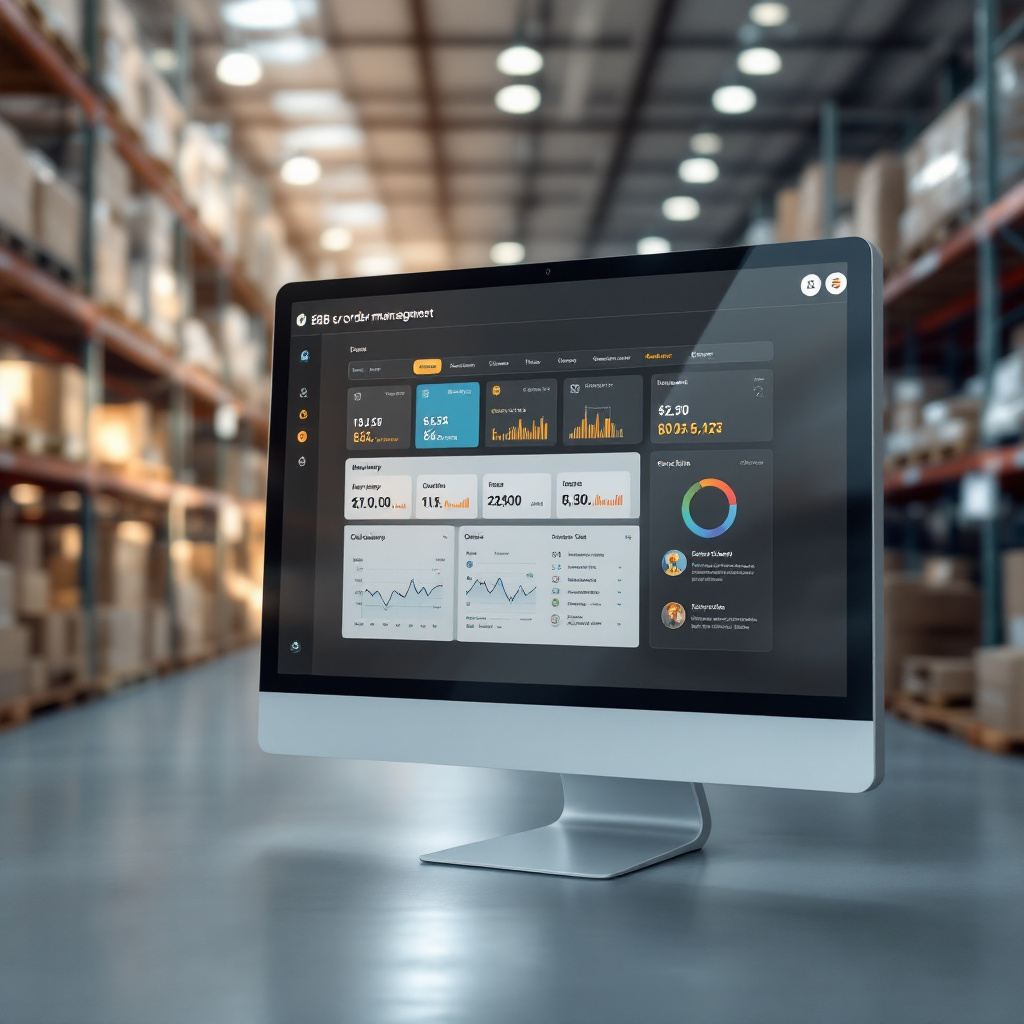order management software
Order management software in a B2B context refers to digital tools designed to efficiently handle the recording, processing, and tracking of business-to-business customer orders. These order management solutions integrate core functions such as automated data entry, centralized order management, and dynamic pricing and discount rules. By facilitating seamless integration with ERP or CRM systems, this software enables consistent and accurate data across departments, ensuring that complex order handling is both streamlined and error-free.
For modern B2B companies, order management software helps reduce manual processes, cut operational costs, and improve your order efficiency. On average, businesses using advanced order management software report up to a 30% reduction in order processing time and a 25% decrease in order errors. This improvement in the order management process directly impacts customer satisfaction rates and supports the entire order lifecycle from initiation to fulfillment.
Order management software streamlines tasks like purchase order management, order tracking, and intelligent order routing. It also helps manage order numbers, integrate financial management functions, and connect with warehouse management for optimized picking and shipping. Many B2B businesses now adopt software that automates not only order capture but also the approval of purchase orders and syncing with inventory management system tools. This is critical in B2B order management platforms where fast, accurate data prevents bottlenecks.
With workflow automation, order management software can integrate with accounting software, ERP systems, and customer portals, offering visibility of order status at every stage. The system offers advanced order processing capabilities, empowering companies to handle both B2B and B2C operations without compromising performance. By implementing the best order management system tailored to the needs of B2B, organizations can enhance business operations, ensure effective order management for businesses, and optimize the overall order processing and inventory tracking performance.

types of b2b order management
When evaluating types of B2B order management, companies typically choose between on-premise, cloud-based, or hybrid solutions. Each model offers unique management features tailored to different operational needs. Traditional order management software, often on-premise, gives businesses full control over their infrastructure, but can involve higher setup costs and longer upgrade cycles.
Cloud-based order management software solutions, by contrast, provide scalability and accessibility from anywhere. A provider that offers a cloud-based order management system allows businesses to handle increased order volumes without additional IT overhead. This type fits well for B2B companies seeking flexibility and lower total ownership costs. Hybrid systems mix both approaches, enabling companies to retain critical on-premise data controls while leveraging the automation of cloud-based tools. As a result, hybrid models can automate the entire order process while maintaining security protocols and best practices for customer privacy.
Use cases vary. Manufacturers benefit from robust order management by linking ERP system data with production schedules. Distributors rely on these integrated management systems to track order movements in real time, while wholesalers need automated order processing to cope with seasonal spikes in sales. For logistics-heavy operations, integrating ERP email automation into B2B order management software helps reduce delays and manual communication.
When considering b2b order management software options, decision-makers should weigh customization needs against ongoing costs and upgrade cadence. They should also examine whether the software should seamlessly integrate with existing warehouse management and accounting tools. The right choice enables management and order tracking to align perfectly with company workflows, supporting efficient order processing and scalable growth.
Drowning in emails? Here’s your way out
Save hours every day as AI Agents label and draft emails directly in Outlook or Gmail, giving your team more time to focus on high-value work.
best b2b order management software
The best B2B order management software in 2025 delivers seamless integration, high uptime, proactive support, and user-friendly interfaces. Platforms such as Shopify Plus, QuoteWerks, Adobe Commerce, and BigCommerce Enterprise are widely recognized as top B2B order management software due to their diverse order management features and consistent performance metrics.
Shopify Plus combines scalability with advanced inventory management, making it a strong order management platform for businesses experiencing rapid expansion. QuoteWerks excels at complex order workflows, unifying quoting and order capture for improved B2B sales efficiency. Adobe Commerce (Magento) caters to the needs of B2B with deep customization options, while BigCommerce Enterprise supports multi-channel capabilities and bulk ordering for large-scale distributors.
Vendor performance also matters. According to industry benchmarks, these platforms maintain high uptime and swift support response times, ensuring zero disruptions in management and order workflows. Many B2B customers choose the best order management software by comparing customer satisfaction scores alongside feature sets and pricing models.
These b2b order management platforms support automated order processing, delivering efficient order handling. The features include like order routing tools, advanced purchase order management, and comprehensive inventory and order management synchronization. For organizations looking to choose a software solution, considering a provider’s ability to handle both B2B and B2C is advantageous. Companies like virtualworkforce.ai complement these platforms by automating related operational communications, ensuring the order management software enables end-to-end efficiency in the order fulfillment process.
choosing b2b order management software
Choosing B2B order management software involves assessing system integration, automation capabilities, and scalability. Businesses must ensure that the software should seamlessly integrate with their ERP system, accounting software, and CRM. This guarantees consistent data across all management systems and helps prevent silos in business operations.
The automation scope is equally important. Software that automates repetitive tasks—such as order capture, invoicing, and fulfillment workflows—offers more than just time savings: it enhances accuracy. For example, to choose the right B2B order, look for software with robust automation and clear workflows for the order fulfillment process. This ensures the software for your business supports efficient order processing and intelligent order routing without unnecessary manual interference.
User experience also plays a role. A clean, intuitive interface reduces training time and lowers error rates. Scalability should match projected growth so the system can handle increased order volumes without degradation. Companies aiming to scale operations without adding staff must prioritize flexibility in the chosen platform.
Pricing models, licensing terms, and vendor support quality are final deciding factors. Businesses that choose the best B2B order align software capabilities with current needs and future requirements. By closely following these steps in choosing B2B order management software, organizations can ensure effective integration, automation, and order processing capabilities to meet the needs of B2B and maximize returns from their best B2B order management software investment.
Drowning in emails? Here’s your way out
Save hours every day as AI Agents label and draft emails directly in Outlook or Gmail, giving your team more time to focus on high-value work.
order fulfillment
Order fulfillment in B2B contexts refers to the coordinated activities required to pick, pack, and ship products accurately and on time. The order fulfillment process starts immediately after an order is confirmed in the order management system, linking inventory allocation with warehouse management.
Technology integrations can greatly improve fulfillment speeds. For example, integrating an AI logistics assistant with carrier APIs ensures real-time shipping label creation and faster pick/pack workflows. A robust order management system connected with WMS ensures real-time updates to the order status while enhancing order tracking.
To optimize order fulfillment, companies monitor KPIs such as order cycle time, fill rate, and return rate. Research indicates that businesses deploying automated systems for warehouse and shipping functions often see faster turnaround times and reduced operational overhead. Management and order coordination become smoother when inventory and order management data are synchronized across systems.
By applying order management best practices—like order routing automation and seamless data exchange between systems—fulfillment accuracy improves. This not only helps meet customer expectations but also reduces returns due to incorrect shipments. Incorporating customer privacy and data management standards into the fulfillment workflow is also essential, ensuring secure handling of sensitive order data throughout the value chain.

real-time inventory management
Real-time inventory management directly impacts order accuracy and customer satisfaction. By connecting the inventory management system with the order management software, organizations ensure immediate visibility into stock levels as orders are placed. This enables proactive adjustments to prevent overselling and reduce stockouts by up to 20%.
Integration tactics include bi-directional syncing with the order management system, inventory alerts, and comprehensive reporting tools. When inventory and order management data flow seamlessly, both sales and fulfillment teams can react quickly to changes in demand. This is particularly useful for b2b customers placing large or complex order requests that require precise stock allocation.
An advanced order management platform with real-time updates supports effective order management and creates opportunities for efficient order processing. It also offers a foundation for b2b order management software streamlines communication between warehouses, suppliers, and sales teams. Businesses that integrate these systems can improve your order completion rates while maintaining consistent order numbers visibility.
For many B2B companies, integrating real-time inventory with their b2b order management solution allows them to manage order adjustments more effectively and keep all stakeholders informed. It also supports order processing and inventory tracking across multiple locations or channels. To safeguard customer data during these processes, adhering to best practices for customer privacy reinforces trust while meeting compliance requirements.
FAQ
What is order management software?
Order management software is a digital tool that streamlines the process of receiving, tracking, and fulfilling customer orders. It integrates various functions like inventory tracking, invoicing, and shipping into one platform.
Why is order management important in B2B?
In B2B, managing orders efficiently reduces errors and improves customer relationships. It also ensures that complex fulfillment needs are met accurately and on time.
What are the main types of B2B order management software?
The main types are on-premise, cloud-based, and hybrid systems. Each type offers different benefits in customization, scalability, and cost.
How does automation improve order processing?
Automation reduces manual entry, speeds up processing, and minimizes errors. This allows staff to focus on strategic tasks instead of repetitive data handling.
Can order management software integrate with ERP systems?
Yes, most modern solutions integrate seamlessly with ERP systems. This ensures consistent data across all business functions.
What KPIs are important for order fulfillment?
Key KPIs include order cycle time, fill rate, and return rate. Monitoring these helps improve efficiency and accuracy.
How does real-time inventory management help?
It prevents overselling, reduces stockouts, and enables proactive replenishment. This leads to higher customer satisfaction.
Which is the best B2B order management software right now?
Platforms like Shopify Plus, Adobe Commerce, BigCommerce Enterprise, and QuoteWerks are leading the market in 2025. The right choice depends on your specific needs.
What is the role of warehouse management in order fulfillment?
Warehouse management coordinates picking, packing, and shipping activities. Integrated systems ensure accuracy and speed in these tasks.
How can virtualworkforce.ai support order management?
virtualworkforce.ai can automate order-related emails, pulling data from ERP, WMS, and other systems. This improves response times and reduces manual errors during the order process.
Ready to revolutionize your workplace?
Achieve more with your existing team with Virtual Workforce.